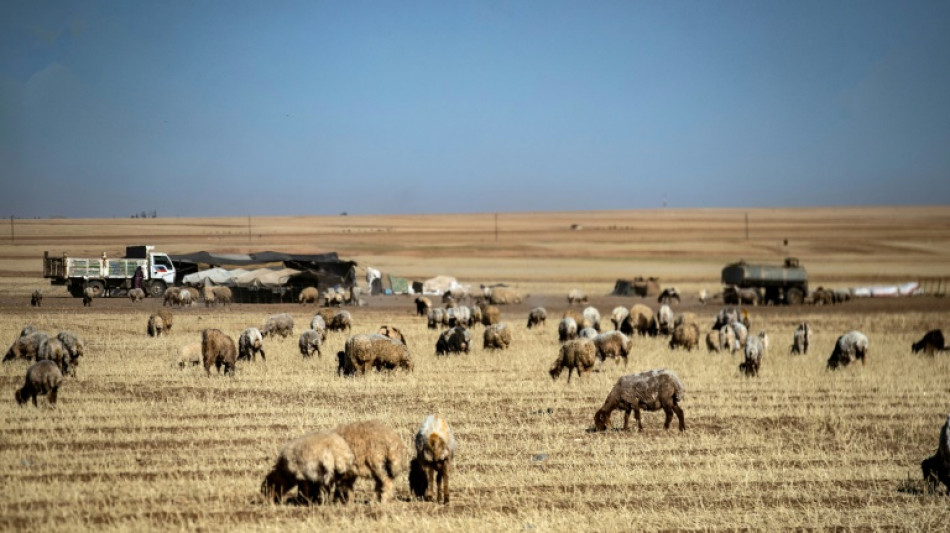
-
 Giroud strikes late to lift Lille past Monaco, Rennes implode early at Lorient
Giroud strikes late to lift Lille past Monaco, Rennes implode early at Lorient
-
Israeli bulldozers uproot hundreds of trees in West Bank village
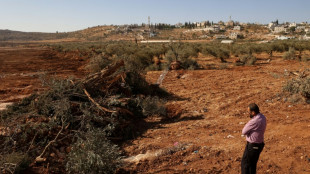
-
 David strikes on Serie A debut as Juve ease past Parma
David strikes on Serie A debut as Juve ease past Parma
-
Sabalenka into US Open second round as Fritz, Shelton advance
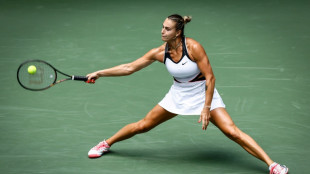
-
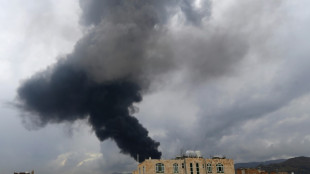 Israeli strikes in Yemen's capital kill four, Huthis say
Israeli strikes in Yemen's capital kill four, Huthis say
-
England's Botterman aiming to be world's 'best loosehead prop'

-
 Kneecap defy critics with 'Free Palestine' chant at Paris gig
Kneecap defy critics with 'Free Palestine' chant at Paris gig
-
New Zealand start Women's Rugby World Cup defence by downing battling Spain

-
 Winless Man Utd need to 'grow up', says Amorim
Winless Man Utd need to 'grow up', says Amorim
-
Shelton romps into US Open second round

-
 Kneecap defy objectors with 'Free Palestine' chant at Paris gig
Kneecap defy objectors with 'Free Palestine' chant at Paris gig
-
US envoy criticises France's lack of action over antisemitism

-
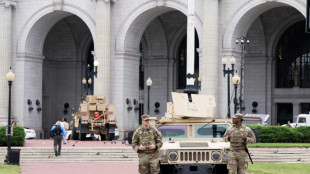 Trump clashes with Democrats as he expands National Guard plans
Trump clashes with Democrats as he expands National Guard plans
-
Raducanu cruises to first US Open win since 2021 triumph

-
 Man Utd still winless after Fulham draw, Everton win to open new stadium
Man Utd still winless after Fulham draw, Everton win to open new stadium
-
Hamburg draws blank on Bundesliga return

-
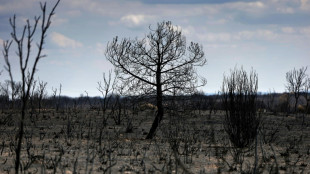 Spain heatwave was 'most intense on record'
Spain heatwave was 'most intense on record'
-
Chaotic Rennes set Ligue 1 red card record and lose 4-0 at Lorient

-
 Russia and Ukraine exchange POWs, civilians
Russia and Ukraine exchange POWs, civilians
-
Moyes sees big step forward after Everton win stadium opener

-
 Vingegaard wins on Vuelta mountain to take overall lead
Vingegaard wins on Vuelta mountain to take overall lead
-
Vingegaard wins on Vuelta mountain

-
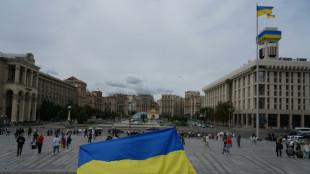 Zelensky calls for Putin talks as peace efforts stall
Zelensky calls for Putin talks as peace efforts stall
-
Everton beat Brighton in new stadium opener

-
 Higgins strikes as Ireland see off Japan in Women's Rugby World Cup
Higgins strikes as Ireland see off Japan in Women's Rugby World Cup
-
Fires ravage an ageing rural Spain
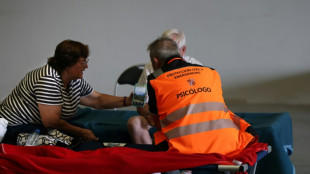
-
 Marc Marquez coasts to seventh successive victory in Hungary
Marc Marquez coasts to seventh successive victory in Hungary
-
Arteta backs Eze to create 'magic moments' at Arsenal

-
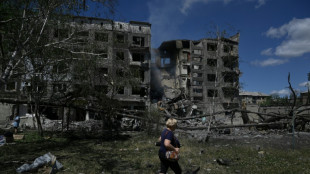 US envoy visits Ukraine on independence day as peace efforts stall
US envoy visits Ukraine on independence day as peace efforts stall
-
Bangladesh and Pakistan bolster ties but war apology 'unresolved'
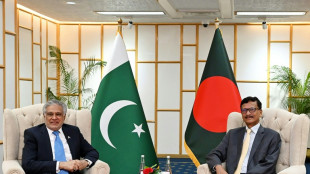
-
 Rowe signs for Bologna after Marseille bust-up
Rowe signs for Bologna after Marseille bust-up
-
Three tons as record-breaking Australia crush South Africa

-
 France's regulator says unable to block dead streamer's channel
France's regulator says unable to block dead streamer's channel
-
UK vows to speed up asylum claims as hotel protests spread

-
 Head, Marsh, Green hit centuries as Australia make 431-2 in 3rd South Africa ODI
Head, Marsh, Green hit centuries as Australia make 431-2 in 3rd South Africa ODI
-
Pujara announces retirement from Indian cricket

-
 Bird call contest boosts conservation awareness in Hong Kong's concrete jungle
Bird call contest boosts conservation awareness in Hong Kong's concrete jungle
-
Kneecap to play Paris concert in defiance of objections

-
 Indonesian child's viral fame draws tourists to boat race
Indonesian child's viral fame draws tourists to boat race
-
Australian quick Morris out for 12 months with back injury

-
 Son scores first MLS goal as LAFC draw 1-1 with Dallas
Son scores first MLS goal as LAFC draw 1-1 with Dallas
-
India's Modi dangles tax cuts as US tariffs loom

-
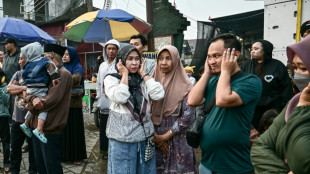 Indonesia turns down ear-splitting 'haram' street parties
Indonesia turns down ear-splitting 'haram' street parties
-
North Korea test-fires two new air defence missiles: KCNA

-
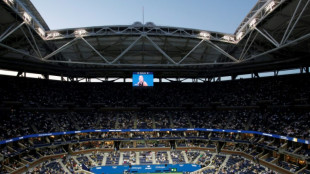 Sinner, Sabalenka chasing rare repeats as US Open gets underway
Sinner, Sabalenka chasing rare repeats as US Open gets underway
-
Venezuela rallies militia volunteers in response to US 'threat'
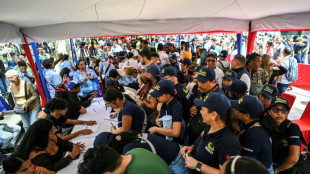
-
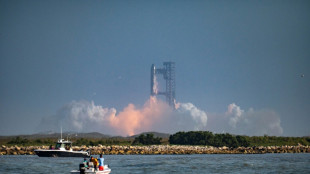 Musk's megarocket faces crucial new test after failures
Musk's megarocket faces crucial new test after failures
-
UK's mass facial-recognition roll-out alarms rights groups

-
 Home hope Henderson, Aussie Lee share Canadian Women's Open lead
Home hope Henderson, Aussie Lee share Canadian Women's Open lead
-
Fucsovics holds off van de Zandschulp for ATP Winston-Salem crown


Syria's climate-scorched wheat fields feed animals, not people
Moussa Fatimi's wheat field was once part of a thriving Syrian breadbasket. Now, he can't even grow enough to feed his family, and the land has been turned over to animals.
Fatimi's crop has withered from a climate crisis, adding to fears of supply shortages sparked by the war in Ukraine as Syria grapples with record-high rates of food insecurity.
"For the second year in a row, we face drought," Fatimi, 85, told AFP at his parched plot.
"We haven't even harvested enough this year to secure our own supply of bread. Our losses are in the millions," he said.
Syria is among the countries most vulnerable and poorly prepared for climate change, which is forecast to worsen, posing a further threat to the wheat harvests that are an essential income source for a war-battered population.
The trend is most evident in Syria's once-fertile northeast where wheat fields are drying to a crisp because of severe drought and low rainfall, challenges also faced by Iraq and other neighbouring countries.
In Umm Hajrah, a village northeast of Hasakeh city, Fatimi meandered through a wheat field dotted with sheep munching on the crops.
"It's just straw. There's no seeds," he said after pulling up a stunted stalk.
Trucks used to queue to ferry bags of Fatimi's wheat to granaries, but now he largely relies on income from other farmers who use his field to graze their animals.
"I feel sorry when I see the sheep eating from the field," he said.
Syria's wheat production averaged 4.1 million tonnes in years prior to its war, which erupted in 2011 after the repression of anti-government protests. Years of subsequent fighting have left around half a million people dead and displaced millions.
Before the war, Syria's wheat production was enough to meet local demand. Harvests then plunged to record lows, leading to increased dependence on imports especially from regime-ally Russia.
Those shipments have continued since Russia's February invasion of Ukraine but the war in Kyiv has sparked fears of a supply crisis as wheat fields shrivel.
- Hotter and hotter -
Northeast Syria is about 0.8 degrees Celsius hotter today than it was 100 years ago with a decreased mean rainfall of about 18 millimetres (0.7 inch) per month over the same period, according to a report released in April by iMMAP, a data-focused non-profit organisation based in Washington.
By 2050, temperatures are expected to be at least two degrees Celsius (3.6 degrees Fahrenheit) higher while precipitation falls by 11 percent, iMMAP said.
The United Nations' Food and Agriculture Organization said that the 210,000 tonnes of wheat grain produced in Hasakeh province during the 2020-2021 winter cropping season were only 26 percent of the previous year.
The low harvest came with an estimated 60 percent of Syria's population food-insecure, according to the UN, and prompted Salman Mohammed Barko to turn his wheat plot into a grazing ground as Fatimi did.
But the money he makes doesn't even cover what he paid to plant the area.
"Climate change has affected us as farmers, with water scarcity, poor production, less rainfall and weather changes" posing a great challenge, said Barko, 55.
Local authorities are trying to support farmers, despite a lack of resources to confront an agricultural crisis compounded by inflation and shortages of fuel and water.
The semi-autonomous Kurdish administration helped irrigate 300,000 hectares of land (741,000 acres) and offered farmers subsidised seeds and fuel in response to this year's drought, agriculture official Laila Mohammed said.
"Climate conditions have affected the production and quality" of wheat crops, she said, explaining that a decline in output is also due to an exodus of farmers during Syria's war.
Adding to water shortages, Turkish-backed groups on the border with Turkey have been building dams on the Khabour river that serves as a lifeline for communities downstream in Kurdish-dominated areas, according to Dutch peace-building organisation PAX.
For Syrian farmer Musa Mohammed, the Kurdish administration isn't doing enough to help.
It buys a kilogram (2.2 pounds) of wheat from farmers for 2,200 Syrian pounds (about 56 cents), which according to him is insufficient.
"This price doesn't compensate us for our expenses. It should have been set at 3,000 at least," said Mohammed, who because of low rainfall -- and soaring fuel costs -- has had to pay more than usual for irrigation.
The 55-year-old planted 10 hectares of wheat this season.
"Farmers are completely dependent on seasonal harvests, but the season is weak this year due to weather conditions, lack of rain, high prices and climate change," Mohammed said.
L.Janezki--BTB
